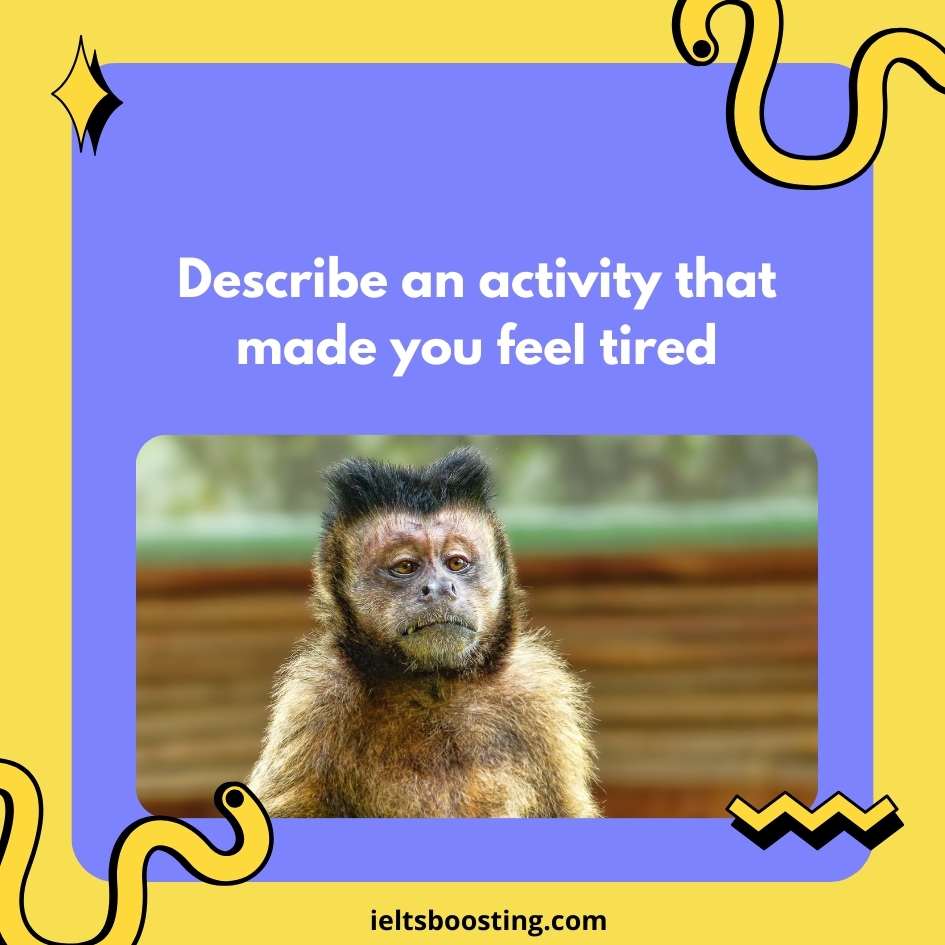Describe an activity that made you feel tired
You should say to describe an activity that made you feel tired
When and where it took place
Why you took part in it
What the activity was
And explain why it made you feel tired
Sample answer to describe an activity that made you feel tired
Last month, I participated in a car trip from Ho Chi Minh City to Nha Trang. We were seeking a new location for practicing martial arts and thought it would be an incredible opportunity to travel after a long day of work. Therefore, we chose Nha Trang, which is famous for its golden sandy beaches and clear blue water.
Before departing, I was full of expectations for a memorable trip, but it turned out to be exhausting for two main reasons. Firstly, the car was small, and I found myself crammed into the back seat. The limited space made it extremely difficult for me to change my position or stretch, leading to a feeling of discomfort throughout the trip.
Moreover, we traveled at the peak of summer, and the heat was almost unbearable. Despite the air conditioning in the car, the outside temperature was sweltering, adding to our overall exhaustion. The heat was relentless, and I remember feeling drained, both physically and mentally, by the time we reached our destination.”

Describe an activity that made you feel tired
Explore more: ielts speaking part 2
Part 3-Describe an activity that made you feel tired
Does studying and learning make people tired today?
Yes, studying and learning can often lead to fatigue in people today, due to the demanding nature of modern educational and professional environments. The pressure to continuously absorb and assimilate large volumes of information can be mentally exhausting. Additionally, the shift towards digital learning platforms, which require prolonged screen time, contributes further to this tiredness. For example, a university student who spends several hours daily attending online lectures and then doing research on a computer is likely to experience both mental and physical fatigue from the constant engagement and screen exposure.
- Challenging (Vietnamese: Đầy thách thức) – Difficult and requiring effort.
- Fatigue (Vietnamese: Mệt mỏi) – Extreme tiredness resulting from mental or physical exertion or illness.
- Demanding (Vietnamese: Đòi hỏi nhiều) – Requiring much skill or effort.
- Assimilate (Vietnamese: Đồng hóa) – To fully understand and integrate information or ideas.
- Mentally Exhausting (Vietnamese: Kiệt sức tinh thần) – Causing extreme mental tiredness.
- Digital Learning Platforms (Vietnamese: Nền tảng học tập số) – Online systems or software used for educational purposes.
- Prolonged (Vietnamese: Kéo dài) – Continuing for a long time or longer than usual.
- Screen Time (Vietnamese: Thời gian sử dụng màn hình) – The amount of time spent looking at a display screen.
- Engagement (Vietnamese: Sự tham gia) – The action of being involved in something.
- Exposure (Vietnamese: Sự tiếp xúc) – The condition of being exposed to something, like screen light in this context.
When do people usually feel tired?
People often feel tired when their bodies and minds are overworked or lack sufficient rest. This fatigue can result from intense physical activities, mental stress, or lack of quality sleep, making it difficult to maintain energy levels throughout the day. For example, a student might feel exhausted after a long day of classes and studying, especially if they had inadequate sleep the night before.
- Overworked (Vietnamese: Làm việc quá sức) – Working excessively hard.
- Sufficient (Vietnamese: Đủ) – Adequate; enough.
- Fatigue (Vietnamese: Mệt mỏi) – Extreme tiredness resulting from mental or physical exertion.
- Intense (Vietnamese: Mạnh mẽ, gay gắt) – Very strong; very great.
- Mental Stress (Vietnamese: Áp lực tinh thần) – Psychological pressure or distress.
- Quality Sleep (Vietnamese: Giấc ngủ chất lượng) – Sleep that is restorative and uninterrupted.
- Energy Levels (Vietnamese: Mức năng lượng) – The amount of energy a person has.
- Exhausted (Vietnamese: Kiệt sức) – Very tired; drained of energy.
- Inadequate (Vietnamese: Không đủ) – Not enough; insufficient.
- Classes (Vietnamese: Các lớp học) – Sessions of instruction in a particular subject.
What do you think about striving for learning and striving for sports?
Striving for learning and striving for sports both represent valuable pursuits that contribute to personal growth in different ways. Learning fosters intellectual development and critical thinking skills, while sports focus on physical fitness, teamwork, and discipline. For example, a student who dedicates time to studying improves their knowledge and problem-solving abilities, just as an athlete develops physical strength and strategic skills through regular training and competition.
- Striving (Vietnamese: Cố gắng) – Making great efforts to achieve or obtain something.
- Pursuits (Vietnamese: Những hoạt động) – Activities or hobbies that someone engages in regularly.
- Fosters (Vietnamese: Nuôi dưỡng) – Encourages the development or growth of.
- Critical Thinking Skills (Vietnamese: Kỹ năng tư duy phản biện) – The ability to analyze facts to form a judgment.
- Physical Fitness (Vietnamese: Thể chất) – The condition of being physically healthy and strong.
- Teamwork (Vietnamese: Làm việc nhóm) – The combined action of a group to achieve a common goal.
- Discipline (Vietnamese: Kỷ luật) – The practice of training people to obey rules or a code of behavior.
- Problem-solving Abilities (Vietnamese: Khả năng giải quyết vấn đề) – The capacity to find solutions to difficult or complex issues.
- Strategic Skills (Vietnamese: Kỹ năng chiến lược) – The ability to plan effectively to achieve long-term or overall aims.
Do people have fewer holidays now than in the past?
In some regions and industries, people do have fewer holidays compared to the past. The modern work environment often prioritizes productivity and longer working hours, leaving less time for leisure and vacations. Additionally, the rise of technology has blurred the boundaries between work and personal life, making it challenging for individuals to disconnect from their jobs. However, some countries and industries have implemented policies to promote work-life balance and ensure people have sufficient time off, but overall, the trend in many places is towards fewer holidays.
- Prioritizes (Vietnamese: Ưu tiên) – To treat something as more important than other things.
- Productivity (Vietnamese: Năng suất) – The effectiveness of productive effort, especially in industry.
- Leisure (Vietnamese: Thời gian rảnh rỗi) – Time free from work or duties.
- Vacations (Vietnamese: Kỳ nghỉ) – Extended periods of recreation, especially spent away from home or traveling.
- Technology (Vietnamese: Công nghệ) – The application of scientific knowledge for practical purposes.
- Blurred (Vietnamese: Làm mờ) – Made unclear or less distinct.
- Boundaries (Vietnamese: Ranh giới) – Limits or borders that define the scope of something.
- Disconnect (Vietnamese: Ngắt kết nối) – To detach or separate oneself from something.
- Work-Life Balance (Vietnamese: Cân bằng công việc và cuộc sống) – The equilibrium between a person’s work and personal life.
- Policies (Vietnamese: Chính sách) – A course or principle of action adopted or proposed by an organization or individual.
- Sufficient (Vietnamese: Đủ) – Adequate; enough.
- Trend (Vietnamese: Xu hướng) – A general direction in which something is developing or changing.
What are the differences between feeling tired after studying and after exercising?
Feeling tired after studying often necessitates leisure activities for relaxation due to mental fatigue caused by extended periods of cognitive work, which can also lead to physical tiredness. One might need to engage in hobbies to be recharged. On the other hand, physical tiredness from exercising, primarily due to muscle fatigue and overall physical exhaustion, tends to bring a sense of relief and accomplishment.
- Leisure Activities (Vietnamese: Hoạt động giải trí) – Activities that are done for enjoyment when one is not working.
- Relaxation (Vietnamese: Sự thư giãn) – The state of being free from tension and anxiety.
- Mental Fatigue (Vietnamese: Mệt mỏi tinh thần) – A state of tiredness that can reduce your mental efficiency.
- Cognitive Work (Vietnamese: Công việc nhận thức) – Tasks that require thinking, reasoning, or remembering.
- Physical Tiredness (Vietnamese: Mệt mỏi về thể chất) – A state of bodily fatigue.
- Hobbies (Vietnamese: Sở thích) – Activities done regularly in one’s leisure time for pleasure.
- Recharged (Vietnamese: Tái nạp năng lượng) – Regaining energy or enthusiasm.
- Muscle Fatigue (Vietnamese: Mệt mỏi cơ bắp) – The decline in ability of a muscle to generate force.
- Physical Exhaustion (Vietnamese: Kiệt sức thể chất) – Extreme tiredness and lack of energy in the body.
- Accomplishment (Vietnamese: Thành tựu) – A sense of achievement or fulfillment.
How can people solve the problem that old people easily get tired?
To address the issue of elderly people easily getting tired, a balanced approach involving physical activity and adequate rest is essential. Engaging in regular, light exercise like walking or gentle yoga can help maintain their energy levels and improve overall stamina. For instance, an elderly person who takes short walks daily may experience less fatigue compared to one who leads a sedentary lifestyle, as moderate physical activity can boost energy and reduce the feeling of tiredness.
- Balanced Approach (Vietnamese: Cách tiếp cận cân đối) – A method that considers all aspects or factors equally.
- Physical Activity (Vietnamese: Hoạt động thể chất) – Any movement that requires your body to burn energy.
- Adequate (Vietnamese: Đủ) – Enough or satisfactory for a particular purpose.
- Engaging (Vietnamese: Tham gia) – Participating in or involving in an activity.
- Light Exercise (Vietnamese: Bài tập nhẹ nhàng) – Physical activity that is not too strenuous.
- Stamina (Vietnamese: Sức bền) – The ability to sustain prolonged physical or mental effort.
- Fatigue (Vietnamese: Mệt mỏi) – Extreme tiredness resulting from mental or physical exertion.
- Sedentary Lifestyle (Vietnamese: Lối sống ít vận động) – A way of life that involves little physical activity.
- Moderate Physical Activity (Vietnamese: Hoạt động thể chất ở mức độ vừa phải) – Exercise that is not too intense and is manageable.
- Boost (Vietnamese: Tăng cường) – Increase or improve.
Xem thêm: sách luyện thi ielts

